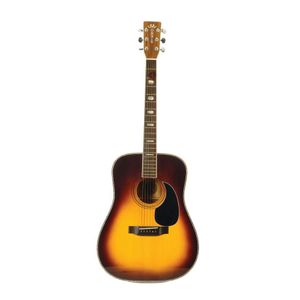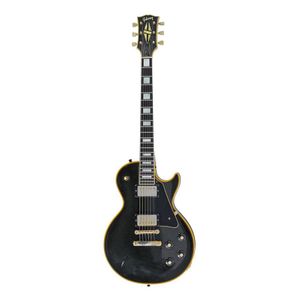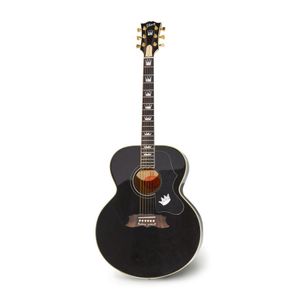Limited Edition Gibson Elvis Presley J-200 'The King' Guitar
You must be a subscriber, and be logged in to view price and dealer details.
Subscribe Now to view actual auction price for this item
When you subscribe, you have the option of setting the currency in which to display prices to $Au, $US, $NZ or Stg.
- Mahogany - Mahogany is a dense, close grained red-coloured timber from the West Indies and Central America. It was first imported into Europe in the the early 18th century and its use continued through the 19th century. It was popular for furniture making because of its strength, the wide boards available, the distinctive grain on some boards, termed flame mahogany and the rich warm colour of the timber when it was polished.. The "flame" was produced where a limb grew out from the trunk of the tree, and this timber was usually sliced into veneers for feature panels on doors, backs and cornices.
Some terms used to describe mahogany relate to the country from which it originally came, such as "Cuban" mahogany, "Honduras" mahogany etc. However unless the wood has been tested the names assigned are more a selling feature, rather than a true indication of the timber's origin. - Mother-Of-Pearl - Mother-of-pearl, technical name "nacre", is the inner layer of a sea shell. The iridescent colours and strength of this material were widely used in the nineteenth century as an inlay in jewellery, furniture, (especially papier mache furniture) and musical instruments.
In the early 1900s it was used to make pearl buttons. Mother-of-pearl is a soft material that is easily cut or engraved.
Nowadays it is a by-product of the oyster, freshwater pearl mussel and abalone industries. - Maple - Maple, native to North America, is a dense heavy timber from light to yellow-brown in colour. It has very little distincive graining unless it is one of the variants such as birds-eye maple or burr maple, so was not used extensively for furniture in 18th and 19th century, where cabinetmakers and designers preferred timbers with more distinctive features such as mahogany, walnut, rosewood and oak.
Birds-eye maple has a seres of small spots linked by undulating lines in the grain, is highly sough and is used as a decorative veneer. Burr maple has larger and irregular grain swirls than birds-eye maple. - Ebony - Ebony is a close grained timber, black in colour. It has a fine texture which can be polished to a high gloss, making it suitable for venereering, inlay and stringing and its use as solid timber is resticted to small decorative items and ornamental decoration, such as chess pieces and musical instrument parts. The term "ebonised" means "faux ebony", timber that has been darkened during the polishing process to resemble ebony.
This item has been included into following indexes:
Visually similar items

A T.F. Morris W-50 acoustic guitar, an exact copy of the Martin D-45, the rosewood fingerboard with inlaid shell detail, mahogany and satinwood body, the head marked 'Morris 011514'; complete with hard case.

A Maton EBG808C small body acoustic/electric guitar, Australian made, serial number 2181 (1003), natural satin finish, selected Queensland maple neck, 6 mm pearl dot inlays, 'AA Select' solid Sitka spruce top, select Queensland maple back and sides, scallo

A Gretsch 6192 'Sunburst' guitar, 1965, American made, serial number 65034, maple hollowbody construction, nitrocellulose 'Tobacco Sunburst' finish, bound 'F' holes, six gold plated Grover machine heads, bound maple body and neck, ebony fingerboard with 'T

A Gibson Les Paul custom ebony electric guitar with OHSC, 1969, American made, serial number 565197 stamped to rear of headstock, six gold 'waffle back' machine heads, deluxe bound mahogany body and neck, ebony fretboard with mother-of-pearl block inlays,
